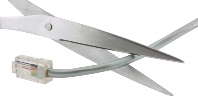
Here’s a real-world, this-really-happened lesson for job seekers: If your cell phone or land line is set up to reject calls that don’t show up in caller ID, you might be screening yourself right out of an interview. This is exactly what happened when one of Pongo Resume's hiring directors (we'll call her Mary) tried to call some job candidates earlier this week.
Mary was working from her home office, preparing to call the most promising candidates for an open position here at Pongo. Her plan was to conduct the initial phone screens that would help her decide who seemed interview-worthy. Since she was using a cell phone, Mary used the *67 trick to prevent her personal number from appearing on the candidate's phone.
(Let me back up, in case you're not up to speed on caller ID codes. Entering *67 on your phone keypad before you place a call blocks your number from appearing in the other party's caller ID. Their phone instead displays the message "Unavailable," or something similar. The *67 code works in North America; other countries use different codes.)
So Mary called the first candidate, and instead of an eager job seeker's voice, she heard a pre-recorded message that went something like this:
"The party you are trying to reach has declined your call. Please call back after enabling caller ID."
Guess what? She didn’t call back. She moved on to the next candidate and thought, "Maybe I'll call this one tomorrow from my office line and get through." Maybe.
Since this had happened to her several times before, Mary decided to do an informal poll. She called a few recruiter friends, who acknowledged that this kind of thing happens all the time, and it can be very frustrating.
If you've programmed your phone to reject unidentified calls, it's probably because you want to screen out telemarketers, or maybe you just like to know who's calling before you answer. But some people do it for another reason, as one of Mary's recruiter friends pointed out:
"When I reach a job candidate whose phone is set up to reject unidentified callers, it raises a red flag," said this tech recruiter from New York City. "It makes me wonder if they’re dodging creditors." Definitely not a perception you want to leave with a prospective employer.
While we're on the topic, here's more advice about job seeker phone blunders.
Bottom line: Whenever you're actively searching for a job, disable the blocked call feature. It's far better to have to hang up on a few telemarketers or answer a few wrong numbers than to turn away potential interviews. After you've landed the job you want, go ahead and reactivate it.
Job seekers: Do you like to block unidentified calls? Is the perception brought up in this post fair?
Recruiters: Have any other thoughts about how candidates might unknowingly be sabotaging their chances?
Ready To Jump Start Your Job Search?
